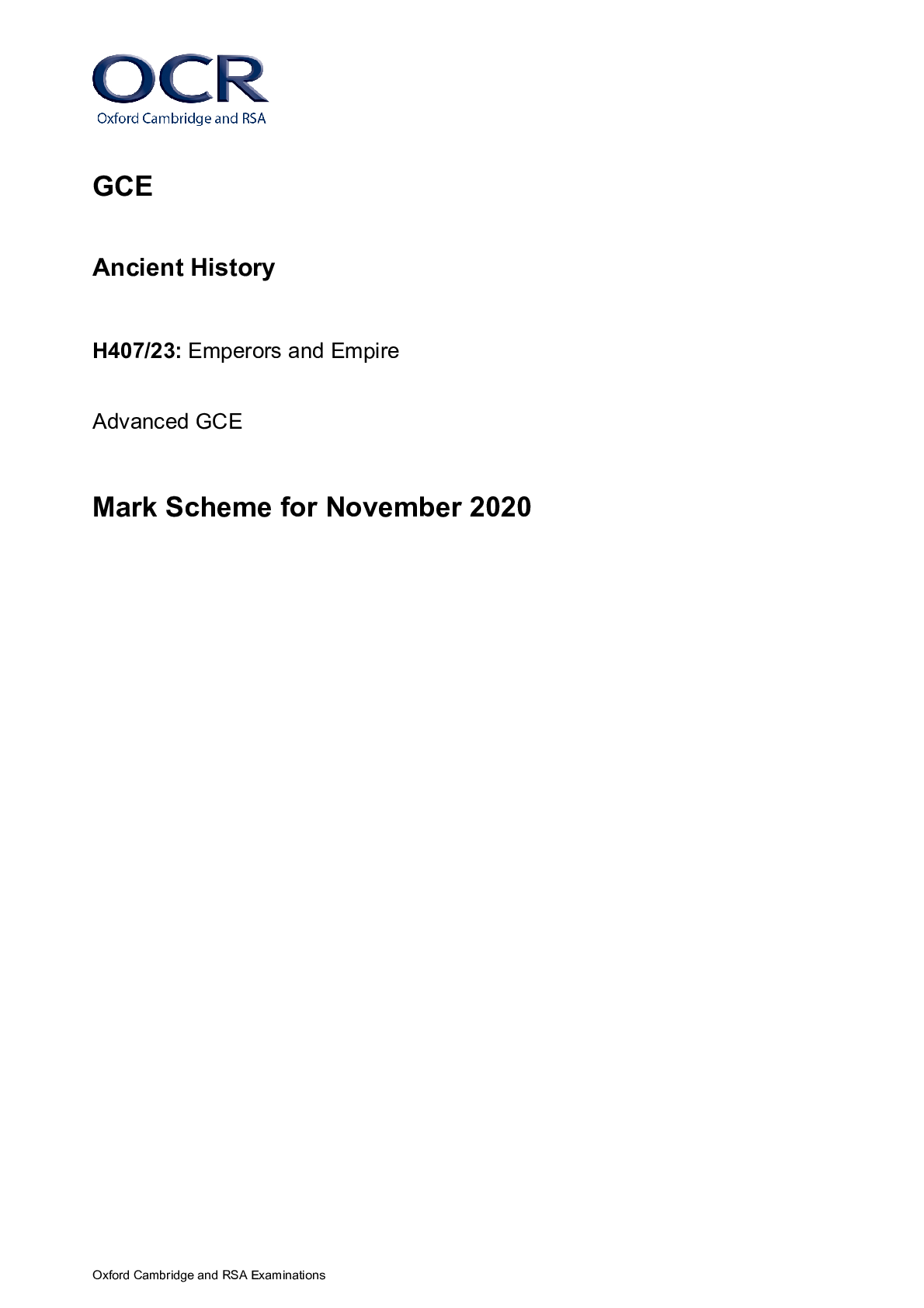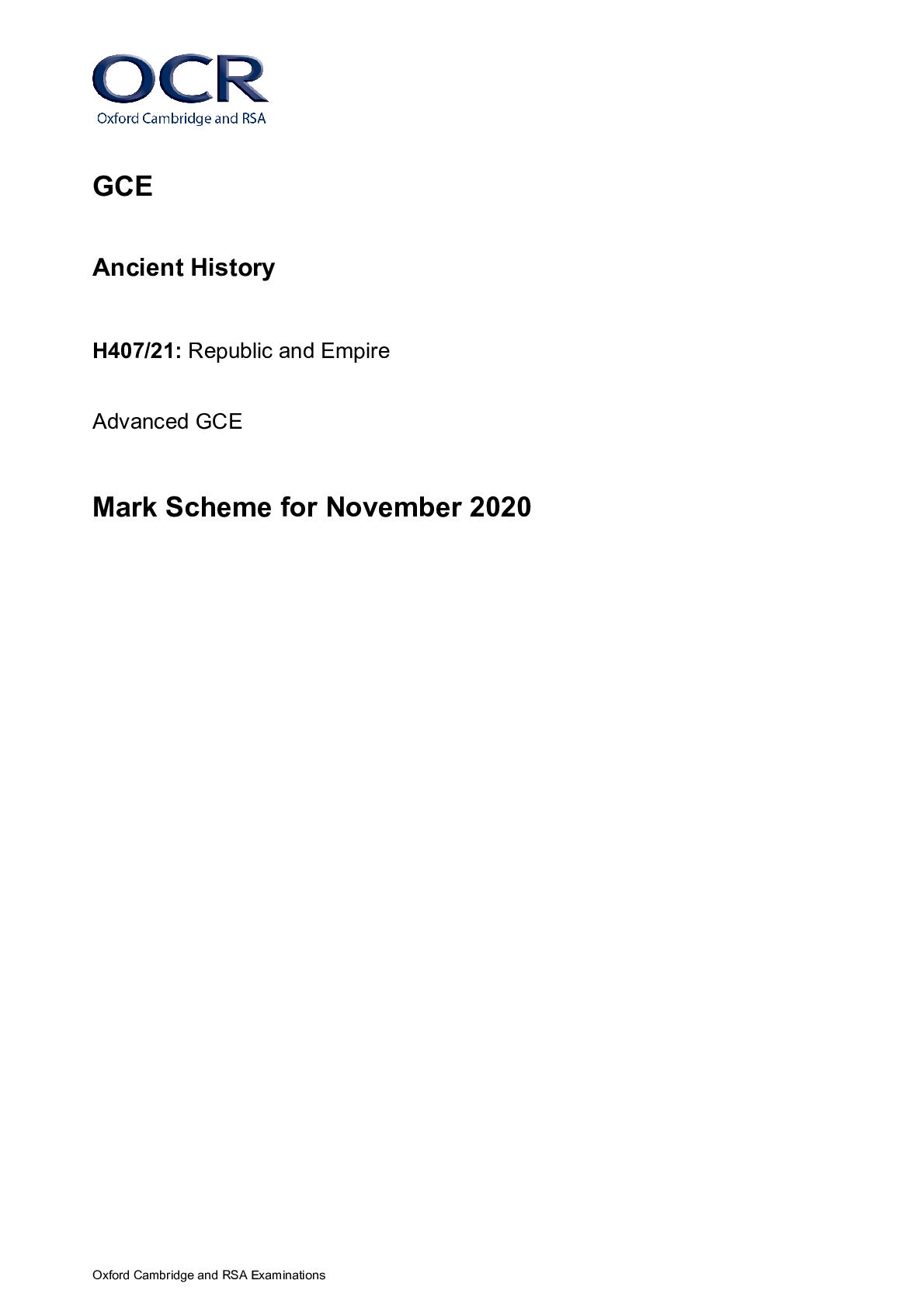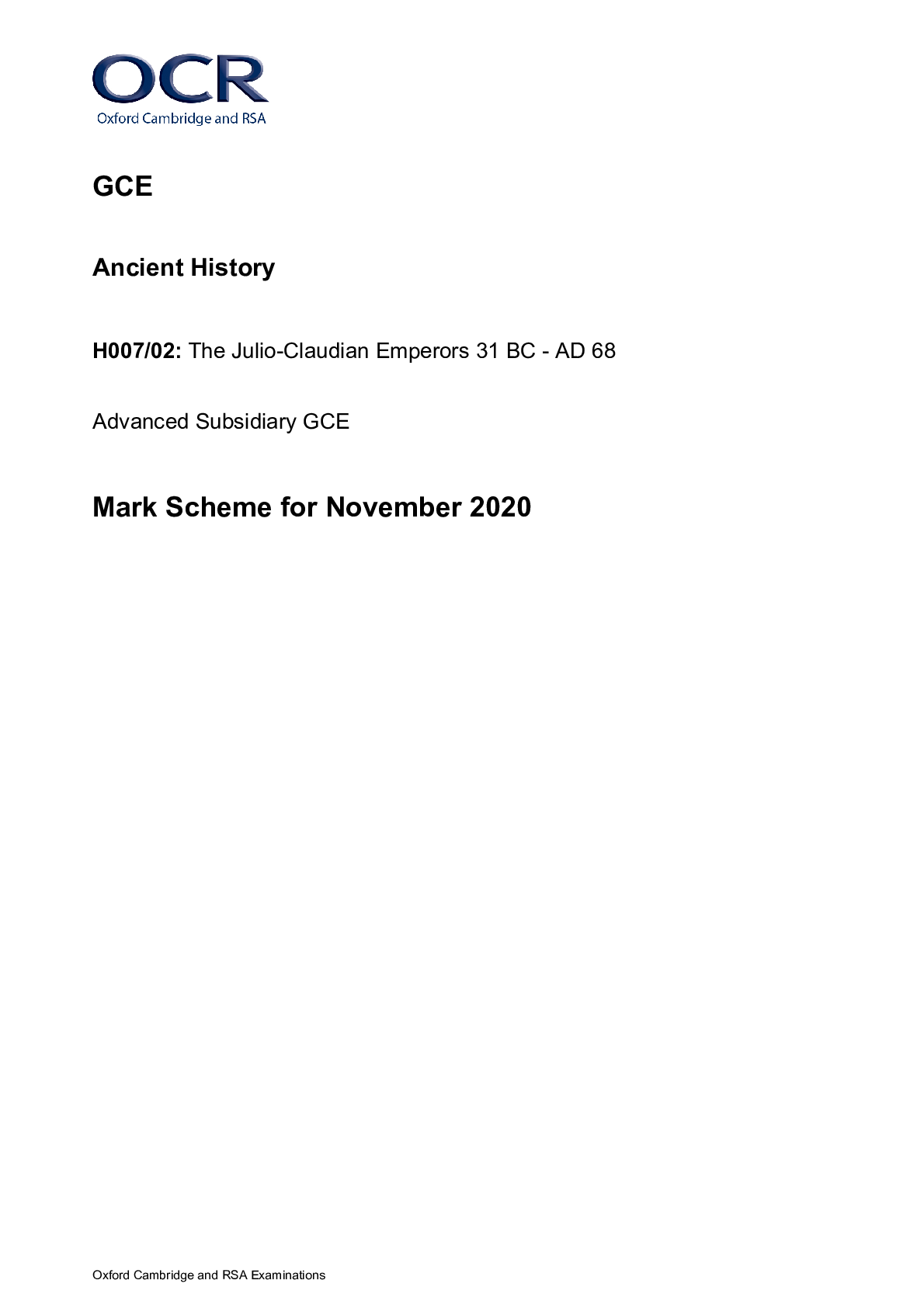Latin > AS Level Mark Scheme > GCE Latin H443/01: Unseen translation Advanced GCE Mark Scheme for November 2020 (All)
GCE Latin H443/01: Unseen translation Advanced GCE Mark Scheme for November 2020
Document Content and Description Below
GCE Latin H443/01: Unseen translation Advanced GCE Mark Scheme for November 2020 Oxford Cambridge and RSA Examinations GCE Latin H443/01: Unseen translation Advanced GCE Mark Scheme for November... 2020Oxford Cambridge and RSA Examinations OCR (Oxford Cambridge and RSA) is a leading UK awarding body, providing a wide range of qualifications to meet the needs of candidates of all ages and abilities. OCR qualifications include AS/A Levels, Diplomas, GCSEs, Cambridge Nationals, Cambridge Technicals, Functional Skills, Key Skills, Entry Level qualifications, NVQs and vocational qualifications in areas such as IT, business, languages, teaching/training, administration and secretarial skills. It is also responsible for developing new specifications to meet national requirements and the needs of students and teachers. OCR is a not-for-profit organisation; any surplus made is invested back into the establishment to help towards the development of qualifications and support, which keep pace with the changing needs of today’s society. This mark scheme is published as an aid to teachers and students, to indicate the requirements of the examination. It shows the basis on which marks were awarded by examiners. It does not indicate the details of the discussions which took place at an examiners’ meeting before marking commenced. All examiners are instructed that alternative correct answers and unexpected approaches in candidates’ scripts must be given marks that fairly reflect the relevant knowledge and skills demonstrated. Mark schemes should be read in conjunction with the published question papers and the report on the examination. © OCR 2020H443/01 Mark Scheme November 2020 2 Annotations Annotation Meaning Annotation Meaning omission incorrect Consequential or repeated error Benefit of doubt 0 mark 1 mark 2 marks 3 marks 4 marks 5 marks Incorrect (scansion question) Correct (scansion question) Blank page SEEN SeenH443/01 Mark Scheme November 2020 3 Subject Specific Marking Instructions Guidance on applying the marking grids The general principle in assessing each section should be the proportion (out of 5) of sense achieved. One approach for each section is given. Acceptable alternatives will be illustrated during Standardisation, but examiners should assess on its own merits any approach that satisfactorily conveys the meaning of the Latin – the crucial consideration being the extent to which every Latin word is satisfactorily rendered in some way in the English. The determination of what a ‘slight’ error is only necessary when it is the only error in a translation; this distinction will then determine whether a mark of 5 or 4 is appropriate. Where marks of 4, 3, 2, 1 and 0 are applicable, the overall proportion of meaning conveyed in the section is the only consideration. The term ‘major’ error has been used here to determine an error which is more serious than a ‘slight’ error. The classification below should be seen only as a general guide, the intention of which is to maintain standards year-on-year. Lead markers should consider each instance on its own merits in the context of the passage and the section. 1. Wrong past tenses are generally considered a ‘slight’ error, but other tense errors are ‘major’. Note, however, that perfect participles can often be correctly translated as present. Note also that allowance must be made for differences of idiom (e.g. ubi venerunt: ‘when they had come’ would be correct; similarly ‘when they came’ for cum venissent). Where there are historic presents, the candidate should consistently use the past or present; if the candidate is inconsistent, the error should be counted once only, as a ‘slight’ error. If a candidate repeatedly makes the same error of tense, the error should be counted once only. 2. Vocabulary errors that are close to the right meaning are ‘slight’ errors; any wrong meaning that alters the sense is ‘major’. (e.g. amicis suasit: ‘he persuaded his friends’ would be a ‘slight’ error; ‘he spoke to his friends’ would be ‘major’). 3. Omission of particles (e.g. conjunctions) that add nothing to the sense (e.g. autem) may be ignored; those that add little to the sense (e.g. sed, tamen, igitur) are ‘slight’ errors; omission of other words is generally a ‘major’ error. All likely omissions should be categorised at Standardisation. 4. Errors of number are usually ‘major’, but where the difference is minimal, they are ‘slight’ (e.g. vinis consumptis: ‘the wine having been consumed’); sometimes they can be ignored altogether (e.g. haec dixit ‘he said this’; maximi labores ‘very great work’; curae iraeque ‘anxiety and anger’). Each instance should be categorised at Standardisation. 5. Errors of construction are always ‘major’, unless a construction has been successfully paraphrased (e.g. promisit se celeriter adventurum esse: ‘he promised a swift arrival’).H443/01 Mark Scheme November 2020 4 6. Errors of case are always ‘major’, unless the containing clause has been successfully paraphrased. (e.g. tribus cum legionibus venit: ‘he brought three legions with him’). 7. Change from active to passive is allowable if the agent is expressed or if the agent is omitted and the sense is not compromised. If the agent is omitted and the sense is compromised, it is a ‘slight’ error (e.g. regem interfecerunt: ‘the king was killed’ would be allowable if it were obvious from the preceding sentence who killed the king; if it were not clear who killed him, a ‘slight’ error should be indicated). The final decisions on what constitutes a ‘slight’ and ‘major’ error will be made and communicated to assessors via the standardisation process (after full consideration of candidates’ responses) and these decisions will be captured in the final mark scheme for examiners and centres. Marking grid Marks Description 5 Accurate translation with one slight error allowed. 4 Mostly correct 3 More than half right 2 Less than half right 1 Little recognisable meaning or relation to the Latin 0 No response or no response worthy of creditH443/01 Mark Scheme November 2020 5 Livy Answer Mark Guidance 1 (i) fuit vir dignus omni laude, non animi solum vigore sed etiam corporis viribus excellens. He was a man worthy of all praise, outstanding not only in the vigour of his mind but also in the strength of his body. 5 corporis viribus: allow ‘bodily strength’. excellens: require it to be taken with vigore as well as viribus. sed etiam: allow ‘but even’. 1 (ii) praecipua pedum pernicitas inerat victoremque cursu omnium aetatis suae fuisse ferunt seu crurum vi seu exercitatione multa; He had particular swiftness of foot and they say that he was the quickest runner of everyone of his age, either through the strength of his legs or much training; 5 Allow ‘he was particularly swift of foot’ vel sim. ferunt: allow ‘it is said’. ferunt = ‘they think’: minor error. omnium taken with cursu (e.g. ’every race’): major error. suae: major error if omitted. multa exercitatione: allow ‘many exercises’. 1 (iii) eo duce, asperrimam fuisse militiam pediti equitique, quia ipse invicti ad laborem corporis esset. under him as leader, military service was very tough for foot-soldiers and cavalry, since he himself had an invincible body in the face of hard work. 5 eo duce: allow ‘because of that leader’. asperrimam: minor error if superlative missed. ad laborem = ‘by hard work’: slight error. 1 (iv) equites aliquando ausi sunt ab eo petere ut sibi pro re bene gesta remitteret aliquid laboris; The cavalry once dared to ask from him that he let them off some work in return for something successfully done. 5 ut = ‘in order to’: major error. ab eo petere ut: allow ‘to ask him to’. aliquid laboris = ‘any work’: minor error.H443/01 Mark Scheme November 2020 6 1 (v) quibus ille ‘cum ex equis descendetis,’ inquit ‘remitto ne dorsum demulceatis’. He said to them ‘When you get down from your horses, I let you off stroking their back(s).’ 5 cum = ‘since’: major error (must be temporal). quibus: ‘to which’ – minor error (require ‘to them’ vel sim.) equis – allow singular. 1 (vi) et auctoritas erat in eo viro ingens pariter in socios civesque. praetor quidam per timorem segnius suos duxerat in primam aciem; And there was an authority in that man equally towards allies and citizens. A praetor had led his men into the front line rather too slowly through fear. 5 segnius: allow ‘more/rather/quite slowly’. duxerat: minor error if pluperfect missed. in primam aciem: require ‘into’. 1 (vii) quem cum Papirius vocari iussisset, lictorem sumere securem iussit. exanimi stante praetore ... When Papirius had ordered him to be called, he ordered his attendant to pick up an axe. As the praetor stood terrified ... 5 quem: must refer to the praetor. 1 (viii) ‘age, lictor, excide radicem hanc’ inquit ‘incommodam ambulantibus’, eumque perfusum ultimi supplicii metu dimisit. ... he said ‘Come, attendant, cut out this root, which is a nuisance for people walking’, and he sent him away, sweating with fear of the ultimate punishment. 5 age: allow ‘come on’, ‘act’. excide = ‘kill’: major error.H443/01 Mark Scheme November 2020 7 1 (ix) haud dubie illa aetate nemo unus erat vir quo magis innixa res Romana staret. Without doubt in that generation there was no single man on whom the Roman state depended more. 5 1 (x) quin etiam eum parem destinant magno Alexandro ducem, si arma Asia perdomita in Europam vertisset. Indeed they consider him an equal general to Alexander the Great, if he had turned his arms against Europe after subduing Asia. 5 quin etiam = ‘even’: allow. destinant: major error if taken as past tense. arma = ‘with arms’: major error.H443/01 Mark Scheme November 2020 8 Ovid Answer Mark Guidance 2 (a)(i) proque domo longis spelunca recessibus ingens, abdita, vix ipsis invenienda feris; And in front of his house was a mighty cave with long recesses, hidden, scarcely discoverable by wild animals themselves. 5 proque domo: allow ‘in place of a house’. recessibus: allow ‘tunnels’. invenienda: allow ‘approachable’. 2 (a)(ii) ora super postes adfixaque bracchia pendent, squalidaque humanis ossibus albet humus. Faces hung above the doorposts and arms affixed, and the rough/filthy ground was white with human bones. 5 super: require ‘above’. 2 (a)(iii) ille aditum fracti praestruxerat obice montis; vix iuga movissent quinque bis illud opus. He/Cacus had blocked the entrance with an obstacle of broken mountain; barely could ten pairs of oxen have moved that construction. 5 movissent: major error if subjunctive missed. opus = ‘work’: allow opus = ‘task’: major error (wrong sense). 2 (a)(iv) nititur hic umeris (caelum quoque sederat illis) et vastum motu conlabefactat onus. He/Hercules pushed against it with his shoulders (the heavens had also sat on them) and he loosened the vast weight by the movement. 5 sederat = ‘he had seated’: major error umeris: allow as singular.H443/01 Mark Scheme November 2020 9 2 (a)(v) quod simul eversum est, fragor aethera terruit ipsum, ictaque subsedit pondere molis humus. As soon as it was overturned, a crash terrified the very ether, and the ground it struck collapsed under the weight of the great stone. 5 quod = ‘because’: major error. ipsum taken with fragor: major error. molis = ‘soft’: major error. 2 (a)(vi) prima movet Cacus conlata proelia dextra remque ferox saxis stipitibusque gerit. Cacus fought the first battles hand to hand, and fought fiercely with rocks and logs of wood. 5 prima = ‘at first’: major error. rem gerit: allow literal translation. 2 (a)(vii) quis ubi nil agitur, patrias male fortis ad artes confugit, et flammas ore sonante vomit; When nothing was being achieved by this, he resorted, not very brave, to his father’s arts, and vomited flames from his roaring mouth. 5 quis ubi nil agitur: allow ‘when none of this worked’. male fortis: if incorrect or omitted, treat as a single error. 2 (a)(viii) occupat Alcides, adductaque clava trinodis ter quater adverso sedit in ore viri. Hercules attacked and his triple-knotted club was applied and came down three or four times onto the hostile/opposing face of the man. 5 adducta: allow sensible departures from the literal (e.g. ‘he swung his triple-knotted club ...’). Allow Hercules to be the subject of sedit. 2 (a)(ix) ille cadit mixtosque vomit cum sanguine fumos et lato moriens pectore plangit humum. He/Cacus fell and vomited smoke mixed with blood, and dying he beat the ground with his broad breast. 5H443/01 Mark Scheme November 2020 10 2 (b) – v v |– – | – – |– v v | – v v | – x ora super postes adfixaque bracchia pendent, – v v | – – | – | – v v | – v v | x squalidaqu(e) humanis ossibus albet humus. 5 Two lines give 12 feet (taking the syllable before the caesura in the pentameter as a foot). Each correct foot should be ticked and the number of ticks converted to a mark out of 5. It is OK for the candidate to mark final syllable as anceps (x) even if the quantity is obvious. NB A foot cannot be marked correct if the quantities are incorrect. 5 11–12 feet correct 4 9–10 feet correct 3 7–8 feet correct 2 5–6 feet correct 1 3–4 feet correct 0 0–2 feet correctOCR (Oxford Cambridge and RSA Examinations) The Triangle Building Shaftesbury Road Cambridge CB2 8EA OCR Customer Contact Centre Education and Learning Telephone: 01223 553998 Facsimile: 01223 552627 Email: general.qualifications@ocr.org.uk [Show More]
Last updated: 2 years ago
Preview 1 out of 12 pages

Buy this document to get the full access instantly
Instant Download Access after purchase
Buy NowInstant download
We Accept:

Reviews( 0 )
$6.00
Can't find what you want? Try our AI powered Search
Document information
Connected school, study & course
About the document
Uploaded On
Oct 07, 2022
Number of pages
12
Written in
Additional information
This document has been written for:
Uploaded
Oct 07, 2022
Downloads
0
Views
96






.png)








